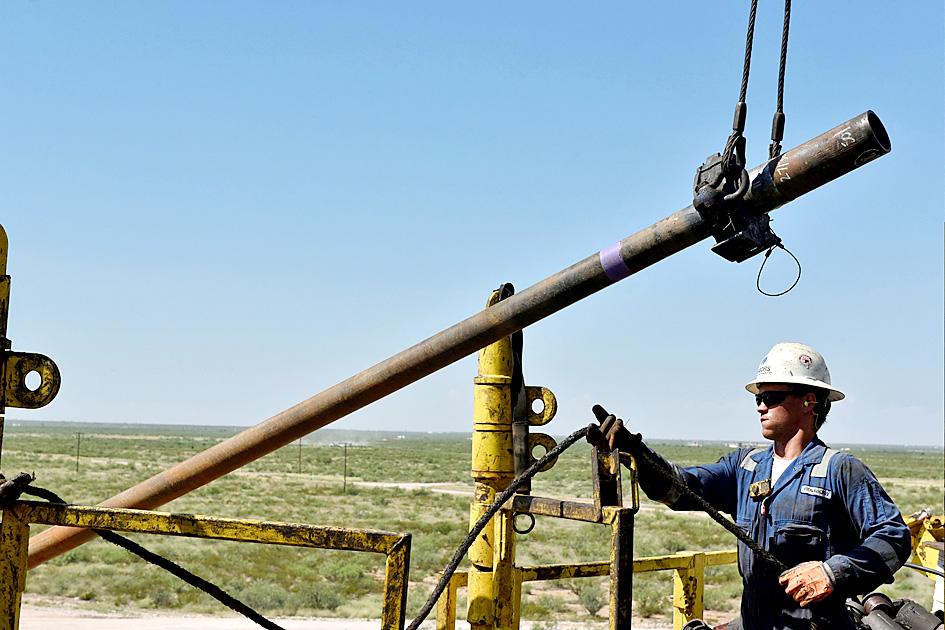Oil rose for an eighth straight week as tensions between Ukraine and Russia heightened concern about tight global supplies.
The global benchmark on Friday touched US$95 a barrel before paring gains.
West Texas Intermediate for March delivery rose 3.58 percent to US$93.10 a barrel, up 0.86 percent from a week earlier.

Photo: Reuters
Brent Crude for April delivery rose 3.31 percent to US$94.44, a weekly increase of 1.25 percent.
US National Security Adviser Jake Sullivan on Friday said that the US believes Russia could take offensive military action or attempt to spark a conflict inside Ukraine as early as next week.
A potential Russian invasion of Ukraine could not only disrupt crude supplies, but also spark retaliatory sanctions by the US.
Oil prices have soared in the past few weeks on speculation that demand could outpace supply as the global economy rebounds from the COVID-19 pandemic.
Russia has denied it plans to invade.
“The oil market was waiting for a major catalyst to justify a move above US$100, and it seems the Ukraine situation just took a turn for the worse,” said Edward Moya, Oanda Corp’s senior market analyst for the Americas. “If Russian troop movement is confirmed over the next week, crude supply disruption expectations could send oil another 10 percent higher.”
OPEC on Thursday said that the rebound in oil consumption could surpass its forecasts this year as economic activity improves and travel gathers pace.
The OPEC+ coalition’s “chronic” struggle to revive output is also likely to support prices, unless the group’s Middle Eastern heavyweights pump more, the International Energy Agency said.
“The oil market is incredibly tight,” Toril Bosoni, head of the agency’s oil markets division, said in a Bloomberg Television interview on Friday. “Prices continue to surge and are now reaching levels that are uncomfortable for consumers across the world.”
Yet oil’s rally is facing some headwinds, as officials from the US to Europe have said that sides are closing in on a nuclear pact after talks resumed in Vienna on Tuesday.
Bank of America Corp said its expectation that Brent will hit US$120 a barrel by the middle of the year is now at risk as the Iranian nuclear negotiations proceed.
The deal could tip markets into a surplus of as much as 1 million barrels a day in the second half of the yer, pushing Brent down by US$10 to US$15 a barrel.
“An Iran deal would be a game-changer, potentially pushing the global petroleum market into a surplus,” Bank of America analysts led by Francisco Blanch wrote in a report.
Additional reporting by staff writer

Sweeping policy changes under US Secretary of Health and Human Services Robert F. Kennedy Jr are having a chilling effect on vaccine makers as anti-vaccine rhetoric has turned into concrete changes in inoculation schedules and recommendations, investors and executives said. The administration of US President Donald Trump has in the past year upended vaccine recommendations, with the country last month ending its longstanding guidance that all children receive inoculations against flu, hepatitis A and other diseases. The unprecedented changes have led to diminished vaccine usage, hurt the investment case for some biotechs, and created a drag that would likely dent revenues and

Global semiconductor stocks advanced yesterday, as comments by Nvidia Corp chief executive officer Jensen Huang (黃仁勳) at Davos, Switzerland, helped reinforce investor enthusiasm for artificial intelligence (AI). Samsung Electronics Co gained as much as 5 percent to an all-time high, helping drive South Korea’s benchmark KOSPI above 5,000 for the first time. That came after the Philadelphia Semiconductor Index rose more than 3 percent to a fresh record on Wednesday, with a boost from Nvidia. The gains came amid broad risk-on trade after US President Donald Trump withdrew his threat of tariffs on some European nations over backing for Greenland. Huang further

CULPRITS: Factors that affected the slip included falling global crude oil prices, wait-and-see consumer attitudes due to US tariffs and a different Lunar New Year holiday schedule Taiwan’s retail sales ended a nine-year growth streak last year, slipping 0.2 percent from a year earlier as uncertainty over US tariff policies affected demand for durable goods, data released on Friday by the Ministry of Economic Affairs showed. Last year’s retail sales totaled NT$4.84 trillion (US$153.27 billion), down about NT$9.5 billion, or 0.2 percent, from 2024. Despite the decline, the figure was still the second-highest annual sales total on record. Ministry statistics department deputy head Chen Yu-fang (陳玉芳) said sales of cars, motorcycles and related products, which accounted for 17.4 percent of total retail rales last year, fell NT$68.1 billion, or

MediaTek Inc (聯發科) shares yesterday notched their best two-day rally on record, as investors flock to the Taiwanese chip designer on excitement over its tie-up with Google. The Taipei-listed stock jumped 8.59 percent, capping a two-session surge of 19 percent and closing at a fresh all-time high of NT$1,770. That extended a two-month rally on growing awareness of MediaTek’s work on Google’s tensor processing units (TPUs), which are chips used in artificial intelligence (AI) applications. It also highlights how fund managers faced with single-stock limits on their holding of market titan Taiwan Semiconductor Manufacturing Co (TSMC, 台積電) are diversifying into other AI-related firms.